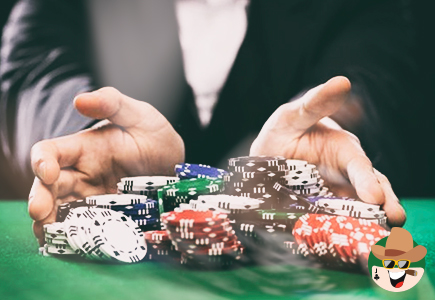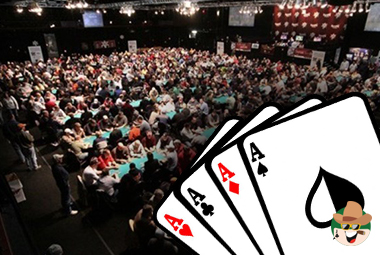

'Dear Geno,' a member writes. 'My friends and I formed a small poker club in Oklahoma City. While we think we are pretty good, we don't know how we will stack up against the better players. Several of us are planning a week in Las Vegas and we would appreciate some solid advice on how to handle the regular people we will be playing against. Our regular game is Texas Hold'em, although we have also played some Omaha High-Low. Your advice, please. Thanks. Alex W., Oklahoma City, OK.'
Oklahoma has some good casinos that feature poker rooms. I have played at Downstream near Joplin, MO. and Indigo Skies, a beautiful casino just outside Seneca, OK.
The Hold'em games in Las Vegas won't be terribly different than the ones Alex and his friends have been playing in their home state. However, I believe I can give them some helpful tips on how to handle the new dealers and the increased pressure I am sure they will feel when they sit down in strange settings.
For beginners, I would urge them not to make raises when they are in early position unless they have really good starting hands. That could lead to real trouble.
I am assuming they are relatively new at poker and starting players should not play too loosely from early position. Figure out what your standard raise would be (usually anywhere from two to five times the big blind) and make the raise. But be careful after the flop as those Las Vegas players are capable of making moves on you.
Since Alex and his pals plan to be in Las Vegas, I would assume they will be playing in some poker tournaments. If this happens, they will face antes which are an essential part of a tournament once it gets underway. The contribution of antes can make a significant difference in the starting hands a person plays. Without an ante, you can afford to play more conservatively. But antes can be costly and deplete your stack of chips. And the higher the antes get, the more aggressive the experienced players act since they are relaxing their starting hand requirements.
This forces a player to be tougher on the hands he raises. At the beginning of the tournament, you will play fewer starting hands, but when the antes kick in, plan on adding to that number. The antes will also mean that you should consider re-raising pots with better hands like A-K, A-Q suited, A-A, K-K, Q-Q and even J-J. This will tend to drive out the players with borderline hands and will help you protect your stack of chips.
When there is no ante in a tournament, raise hands from early position with any pair of sevens or higher, along with A-K and A-Q. But when there is an ante, add A-J and K-Q along with any two suited cards 10 or higher in early position.

From mid-position, you can re-raise with A-A, K-K, Q-Q, J-J and A-K and play the more experienced players as though they are following this formula. As you become more familiar with the play of the people at your table if a loose player raises, you can generally re-raise him with any legitimate hand in late position.
Now if you happen to find yourself at a table with a player like Daniel Negreanau, Phil Ivey or Phil Hellmuth, they will give you more credit for a good hand when you re-raise than a more inexperienced player. Surprising but true. And you can take advantage of this. Good players in late position outplay beginning players and this is why a re-raise can be vital to winning a hand.
If you are in late position, raise with all pairs 9-9 or higher, A-K through K-Q, and any two suited cards 7-8 or higher. Just call with suited connectors 4-5 or higher, or one or two-gap suited connectors. If you are in the small blind and nobody has called, you can raise with any ace or other playable hand. Just be careful after the flop not to jeopardize too many chips.
By the way, folding the one or two-gap suited connectors would not be a major mistake.
If you have a short stack, your starting hand standards change. If your standard raise represents 25 percent of your chips or higher, consider going all in, even if the hand is just A-7 suited. Tough situations call for tough plays and this is the best way to perform against the better players.
Never slow-play trips or two pairs against experienced players. It just doesn't pay.
If you find yourself with a strong drawing hand -- A-K suited with a flop of 9-7-2 and two of the cards match your suit -- and your bet is raised, consider re-raising since you have many outs even if the person has a hand. One thing is sure, you won't be drawing dead.
Good luck. Let me know how you do.
Author: Geno Lawrenzi Jr.
(Geno Lawrenzi Jr. is an international journalist, magazine author and ghostwriter and poker player who lives in Phoenx, AZ. He has published 2,000 articles in 50 magazines and 125 newspapers. If you want to share a gambling story or book idea with him, send an email to glawrenzi@gmail.com ).





